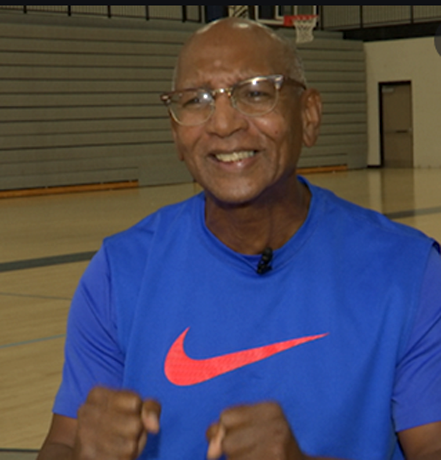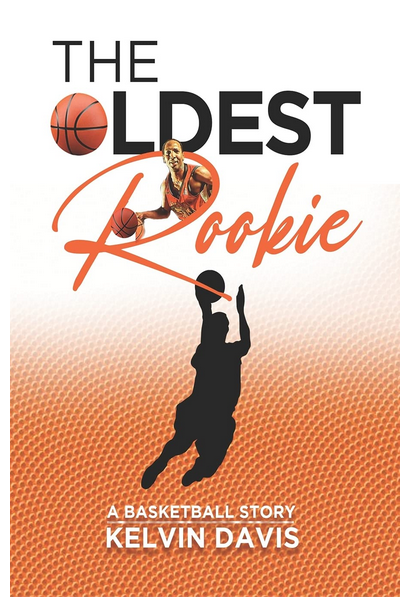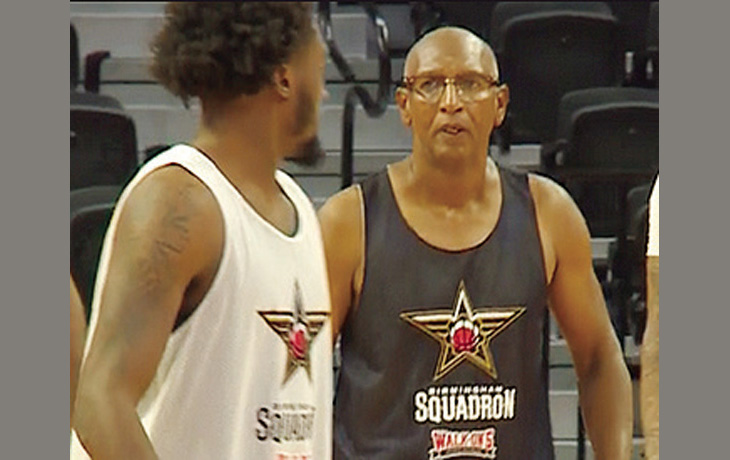Kelvin Davis, at age 62, competes with men less than half his age on the basketball court. His story, however, is more than just about basketball.
by Aubrey Bruce, For New Pittsburgh Courier
“I remember growing up in the small town of Evergreen, Alabama. My mom would wake us up around 6 a.m. to go to the cotton fields to pick cotton. A man by the name of Mr. Johnson would pull into our yard and honk his horn. My brothers and I would run out, hop on the already crowded truck full of people, and we would try to find a space to sit. Many times we would have to sit on top of each other. We would pick cotton all day long and at the end of the day Mr. Johnson would weigh our sack full of cotton, and would pay us five cents per pound. If you picked fifty pounds, you would get $2.50 for the day.” (From the book: “The Oldest Rookie: A Basketball Story,” by Kelvin Davis)
This past August, I received a call from my cousin, Dr. Ramond Bruce of Tampa, Fla. Ray sounded hyped which is very unusual for the always calm, cool and collected Ray. “Cousin,” he said, “14 years ago, a friend of mine that made the roster of an American Basketball Association team at the age of 47; he is about to try out for a G-league team in Birmingham, Ala., at the age of 62.” Considering the fact that I am 68, all I could say at that point was, “Oh really?”
I am glad that Ramond and I were communicating on the phone so that he could not observe my eyebrows going to the back of my head. I was thinking that this might be some sort of ill-conceived publicity stunt at its best or an ultimate flim-flam scam at its worst. How could a 62-year-old man remotely hope to compete with athletes in their early 20s?
My mind began racing. Was Kelvin Davis a direct descendant of Methuselah, the oldest man known to have lived according to the Christian Bible? Could he be a distant cousin of Ponce de Leon, the legendary explorer whose quest was to find “the fountain of youth?”
I called him, and when he answered the phone, just the timbre of his voice alerted me to the fact that the Creator had connected me with someone special. “Hello, this is Bishop Davis,” he said. I replied; “Bishop? I am trying to connect with basketball player Kelvin Davis. My name is Aubrey Bruce. I was referred by Ramond Bruce.”
“Good morning man of God, this is Bishop Kelvin Davis,” he said.
From my initial words with him, he communicated to me that his faith was first and foremost.

This is a story that represents far more than merely shooting and dribbling a basketball by anyone at any age. There was an unimaginable beginning to the life of Kelvin Davis. His innocence and childhood years were violated by soulless individuals that induced him for mere pennies to become a human cotton gin, physically harvesting the “fruit of the south” for those that maybe even to this day continue to deny and dishonor the signing of the emancipation proclamation. How could a child, any child, know how to rebel against the generational and systemic horror of servitude and poverty that he was forced to face?
Kelvin talked about how the experience of working in the cotton fields early in his life possibly provided the physical stamina and the intestinal fortitude that gave him the strength to overcome the obstacles that he would encounter later in life.

KELVIN DAVIS
“You know it did,” he said. “It was what we had to do at the time, because that’s the way the economic situation was. It was a way of life back then to get up in the morning, get on that truck, get to the fields and work all day.
“That was pretty hard, pretty tough,” Kelvin Davis continued. “But I was always thinking like, ‘well, if I ever get a chance to be something in life, I won’t be called back here.’ I was between 9-10 years old, back then even children had to get up and go to work.”
I was flabbergasted just listening to Kelvin recall the atrocities that he was forced to face as a young man because I grew up in a time when I could not even obtain a work permit until I was 14 years of age just to sell popcorn and potato chips at Forbes Field, the home of the Pittsburgh Pirates Baseball Club.
Bishop Davis did not enter the world during the so-called “reconstruction” period in America that followed the Civil War and the abolishment of slavery. His blood, sweat and tears were shed in the 1960s, more than 100 years after African Americans traveled on the road to freedom. Kelvin Davis has displayed no bitterness about the circumstances or toward the people that perpetrated crimes of inhumanity against an innocent child.
His victory over the cotton fields of Alabama gives new meaning to the saying by German philosopher Friedrich Nietzsche: “Out of life’s school of war—what doesn’t kill me, makes me stronger.”

The irony of moving from the cotton fields of the cotton state to the basketball courts of the yellow hammer state should not be lost. If Kelvin Davis could toil in the cotton fields at the age of 9, it truly shows how extraordinary he is continuing to compete on basketball courts at the age of 62.
Kelvin’s dream to play professional basketball at the age of 47 began to pick up steam in 2007 when he tried out for and made the ABA team, the Atlanta Vision. He fondly recalled: “Dennis Scott, one of the NBA legends, watched me play and gave me kudos that (provided a spark for me) and was a strong motivator.”
That was more than 14 years ago.
In September of this year, Kelvin Davis continued his quest to compete as a pro basketball player by trying out for the New Orleans Pelicans’ G-League affiliate, the Birmingham Squadron. On Oct. 5, he received an email from NBA Commissioner Adam Silver. An excerpt from the email reads: “Dear Mr. Davis, it’s inspiring to see you pursue your lifelong dream of playing professional basketball. I have no doubt that your impressive G-League tryout (with the Birmingham Squadron) will encourage others to chase their own dreams.”
Before the saga of Kelvin Davis was profiled, the efforts of other rookies over the age of 30 to make it in the NBA as well as other professional sports leagues have been lauded. Basketball player Pablo Prigioni, at the age of 35, became the oldest rookie in NBA history, when he made his debut with the New York Knicks on Nov. 2, 2012. Ola Kimrin was a place kicker that played in five games at the age of 32 for the Washington Redskins during the 2004 season, becoming the oldest rookie ever to play in an NFL game. Connie Madigan debuted with the St. Louis Blues in January 1973 at the age of 38, becoming the oldest rookie ever to compete in the NHL.
They all competed in their 30s. Kelvin Davis has competed at a high level in his 30s, 40s, 50s and now even in his 60s. He is a unique individual; having been profiled on CNN, Fox, NBC and CBS, among others.
Kelvin Davis is not a “freak of nature;” he is a miracle of God and he appears to be blatantly ignoring the burden of time. He may be appointed by man but if he is chosen to compete on a G-League team, is it possible that God’s anointment is the primary factor? God seems to have revealed the formula of anti-aging to him and forgot to give it to the rest of us. How else can this human phenomenon who seems to be beating father time at his own game be explained?
The efforts of Kelvin Davis to find success as a professional basketball player is not a narcissistic- and ego-fueled attempt to gain adoration and attention: this communiqué represents the continuing story of Kelvin Davis winning over the albatross of aging flesh.
We should all be so lucky.

KELVIN DAVIS, right, during a tryout with the Birmingham Squadron.